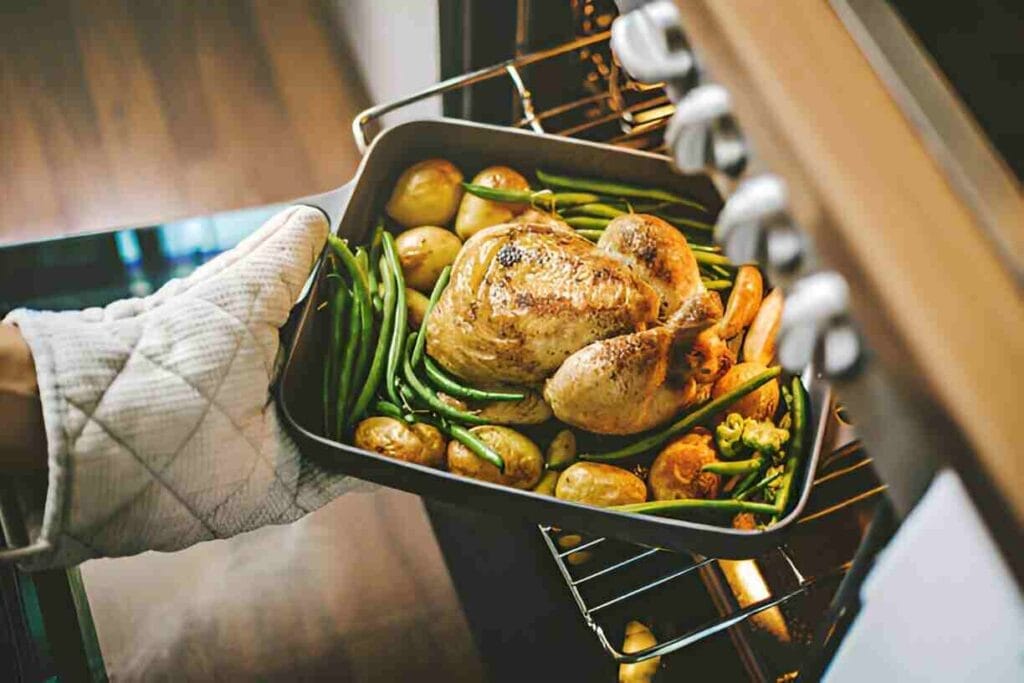Table of Contents
ToggleCalories in Chicken
It is high in protein and low in fat, so chicken is a popular choice for those seeking lean protein. It’s also readily accessible in most restaurants and simple to prepare at home. Whatever cuisine you’re eating, you can find chicken dishes on almost every menu. However, you may be curious in the precise number of Calories in Chicken that’s on your plate.
How much protein in chicken: There are several cuts of chicken, such as drumsticks, wings, thighs, and breasts. The amount of calories and the ratio of protein to fat vary between the cuts.
The calorie values for the most common chicken cuts are shown here.
284 calories in chicken breast

The most famous chicken cut is the breast. It’s a great option for those attempting to reduce weight since it’s low in fat and rich in protein.
The nutritional breakdown of a single without skin, boneless, cooked chicken breast protein (172 g) is as follows:
- 284 calories
- 53.4 g of protein
- 0 g of carbohydrates
- 6.2 g of fat
A serving of 3.5 oz (100 g) of chicken breast nutrition is about 3.6 g of fat, 32 grams of protein, and 165 calories. This indicates that 20% of the total calories in a chicken breast are from fat and 80% are the calories.
Keep in mind that these measurements apply to an unprocessed chicken breast. The overall number of calories, carbohydrates, and fat increases when you begin cooking it in oil and add marinades or sauces.
208 calories in a chicken thigh

Because chicken thighs have more fat than calories in boneless skinless chicken thigh, they are a little more delicious.
Once cooked, skinless, boneless chicken thigh nutrition weighing 116g has
- 208 calories
- 28.8g of protein
- 0 g of carbohydrates
- 9.5g of fat
- 43 calories per chicken wing
You probably don’t think of chicken wings when you think of healthful chicken cuts. But they may fit easily with a healthy diet provided they’re not deep-fried and smothered with sauce or breading.
One 21-gram skinless and boneless calories in chicken wings

- 43 calories
- 6.4 g of protein
- 0 g of carbohydrates
- 1.7 g of fat
Chicken wing calories are 206, 30.5 g of protein, plus 8.1 g of fat every 3.5 oz (100 g). This indicates that 36% of calories are from fat and 64% are from protein.
Drumsticks of chicken: 149 calories
The thigh & the drumstick are the two components of a chicken leg. The leg’s lowest part is called the drumstick.
Chicken leg calories 96g without skin, boneless chicken drumstick has 149 calories.
- 23.2 g of protein
- 0g carbohydrates
- 5.5 g of fat
Chicken drumsticks provide 156 calories, 24.1 g of protein, & 5.7 g of fat per 3.5 oz (100 g). About 65% of the calories are made up of protein and 35% are made up of fat.
Additional chicken slices
While the most common chicken parts include drumsticks, wings, breasts, and thighs, there are a variety of alternative options.
The following are some other chicken slices’ calorie counts:
- Tenderloins of chicken: 89 calories As for the 3.5 ounces (100 g)
- Reverse: 239 energies for the 3.5 ounce (100 g) Trusted Source
- 178 calories are found in 3.5 ounces (100 g) of meat.
- 154 calories per 3.5 oz (100 g) of light meat
- The skin of chicken adds calories.
Even though a skinless chicken breast has 284 calories, 80% protein, and 20% fat, those amounts change significantly when the skin is included.
- Once cooked, skin-on, boneless chicken breast (196 g) has
- 58.4 g of protein
- 15.2 grams of fat
39% of calories in a skin chicken breast are from fat, and 61% are from protein. Eating the skin also adds around 81 calories.
Bottom Line
The majority of chicken pieces are high in calories and fat, making it a popular meat.
The following lists the number of calories in a 3.5-oz of the most popular boneless, skinless chicken cuts:
- 165 calories for a chicken breast
- The thigh of chicken: 179g
- Wings of chicken: 203g
- 155 calories per drumstick of chicken.
- Be aware that consuming the skin or cooking with a lot of fat increases caloric intake.






5 Responses
Can you be more specific about the content of your article? After reading it, I still have some doubts. Hope you can help me.
Share your questions here or send me email at contact@quickfellow.com
Can you be more specific about the content of your article? After reading it, I still have some doubts. Hope you can help me.
Can you be more specific about the content of your article? After reading it, I still have some doubts. Hope you can help me.
Can you be more specific about the content of your article? After reading it, I still have some doubts. Hope you can help me.